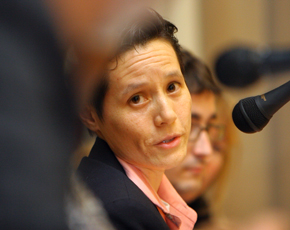‘Faces of Feminism’ discusses cultural aspects of feminism

Fiona Ngo, a Postdoctoral Fellow in the Asian American Studies Program, speaks at “Faces of Feminism” on Tuesday night at Gregory Hall. The panel discussion featured speakers from different backgrounds who answered a series of questions and then particip Josh Birnbaum
Nov 3, 2005
Students and faculty gathered in Gregory Hall on Tuesday night to voice their views and listen to a panel discussion on issues surrounding the development of feminism at “Faces of Feminism.” “Faces of Feminism” was put together mainly by the Feminist Majority and the Sociology Club to educate students about the different cultural issues also involved in feminism, such as race and class, said Maureen Gombas, secretary of Feminist Majority and senior in LAS.
The “Faces of Feminism” panelists, made up of distinguished campus and community leaders, discussed their personal experiences and how those experiences have led them to think about certain cultural experiences within feminism. The forum was then followed by a question and answer session involving the audience.
“What is shocking to me is that the definition of gender equity and women’s rights hasn’t changed in 20 years,” said panelist Karen Simms, program director of the Rape Crisis Services Center. “But what is the finish line for women of color? Sometimes African-American women feel like they have to decide between gender issues and racial issues. There is a constant struggle about who you are aligned to.”
Rolando Romero, founding director and professor of the Latino/Latina Studies program, said he first became interested in feminism and its impact on cultural issues several years ago when he was discussing classes for the Latino/Latina Studies program with a colleague.
“Gender and sexuality became a specific component to the classes we offered,” he said. “We made sure that the courses we developed and taught strongly correlated with gender and sexuality. We wanted to integrate Mexican feminism into the studies.”
Get The Daily Illini in your inbox!
Matt McClain, president of Men Against Sexual Violence and graduate student, brought up issues about the male perspective on feminism during the forum.
“A lot of men still feel very threatened by the idea of feminism,” he said. “They may feel they have to give something up. They need to learn it’s about equality and creating a better world for everyone, not just women.”
There are noticeable differences in men and women, and these differences should be appreciated for what they are, McClain said.
“We need to value these differences equally,” he said. “We need to value jobs that women traditionally do, such as teaching, as much as we value jobs that men traditionally do. We really need to start respecting things that women do.”
Panelist Fiona Ngo, a postdoctoral fellow in the Asian American Studies program, said that she felt one of the biggest challenges for people is the inability to communicate about sensitive issues, whether it be because of gender, race, ethnicity or disability.
“I think a lot of us are raised to not be able to discuss differences,” she said. “Learning is difficult, and it takes something to get through that struggle of communication with the people around you.”
Rev. Karen Bush, director of the United Church of Christ Youth Foundation, spoke from a spiritual perspective and said she was frustrated by the gender roles given in traditional Christianity.
“It is an extremely important concept that God has no gender, and most of mainstream Christianity is still taught (differently),” she said. “What this teaches children is that one gender is closer to God that the other. This is extremely damaging.”
Bush also addressed the audience by focusing on everyday issues, which she feels have become desensitized to the younger generation.
“There is too much of your generation who aren’t upset that Hooters is still in town,” she said to attendees. “There are too many of your peers who like to be called ‘chick’ and who are comfortable with Hooters.”
Katie Gombas, sophomore in LAS and sister of Maureen Gombas, said she found the discussion to be very interesting and really connected to many of the topics that were brought up by Bush.
“It was good to hear about all the media stuff because it really pertains to me,” she said. “You don’t really think about Hooters, but hearing someone say, ‘No, it’s horrible,’ made me realize it really is because it’s so objectifying.”
There was also much discussion about the links between feminism issues and profound poverty, the portrayals of women and of minorities in the media and affirmative action policies. The panelists encouraged attendees to broaden their relationships and lifestyles by doing things like taking an African-American studies or Latino/Latina studies class or getting involved with a cultural group.
“Become the change you wish to see,” Bush said, quoting Mahatma Ghandi. “I never cease to see the changes one student can make. Each of us has a lot of work to do, and none of us is off the hook.”





